Starodub war
China town
Princess Elena was noted in a very important case for Moscow. Apparently, it was planned under Vasily III, but was made by his wife. Moscow has grown. The 1521 siege of the year and the threat of an attack in 1532 showed that the fortifications of the Kremlin are small for a capital city. The moat was the only defense of the tenements.
It was decided to build new fortifications. In May 1534, they began to dig a ditch from the river. Neglinnaya to the Moscow River. On Robots mobilized all the townspeople, with the exception of the nobility, clergy and officials, they allocated servants. The moat was completed in a month. On May 16, 1535, the solemn laying of the stone wall took place, and the first stones in the foundation were laid by Metropolitan Daniel. The construction of the wall was led by the Italian Petrok Maly Fryazin, who built it according to the latest fortification science of the time. The fortifications were designed to accommodate strong artillery. Compared to the Kremlin fortifications, the walls of Kitay-gorod were lower, but thicker, with platforms designed for gun carriages. The wall, completed in 1538, had a length of 2567 m and 12 towers. Initially, four gates were built, bearing the names: Sretensky (from the beginning of the XNUMXth century they were called Nikolsky), Trinity, All Saints (from the XNUMXth century - Barbarian) and Kosmodemyansky. As a result, the area of the protected part of the city has tripled.
Strengthening the capital was a matter of very timely. The change of power in Moscow was not ignored by the neighbors. Sweden and Livonia have not yet shown aggressiveness, sent ambassadors and confirmed peace agreements. Kazan Khan Jan-Ali took the oath to the new sovereign. But the leaders of the Nogais began to threaten a campaign against Moscow. They demanded that the young Ivan recognize them as “brothers and sovereigns”, that is, equal to him in dignity, and pay “time-honored commemorations” - a tribute. However, they were answered firmly, allowed only free trade in horses in Russia. Noghai resigned, they were not going to fight, hoping to take arrogance. Confirmed a general alliance against the Crimean horde.
However, the most powerful enemies remained: the Crimean Khan Sahib-Girey and the Polish-Lithuanian King Sigismund. They decided to use, as it seemed to them, a convenient moment: the rule of the woman and the child. The Crimean Tatars demanded huge tribute: half of the grand duke's treasury. At the same time, the Crimean detachments attacked the Ryazan region. However, the detachments of the Crimean predators were defeated on the river Pronya.
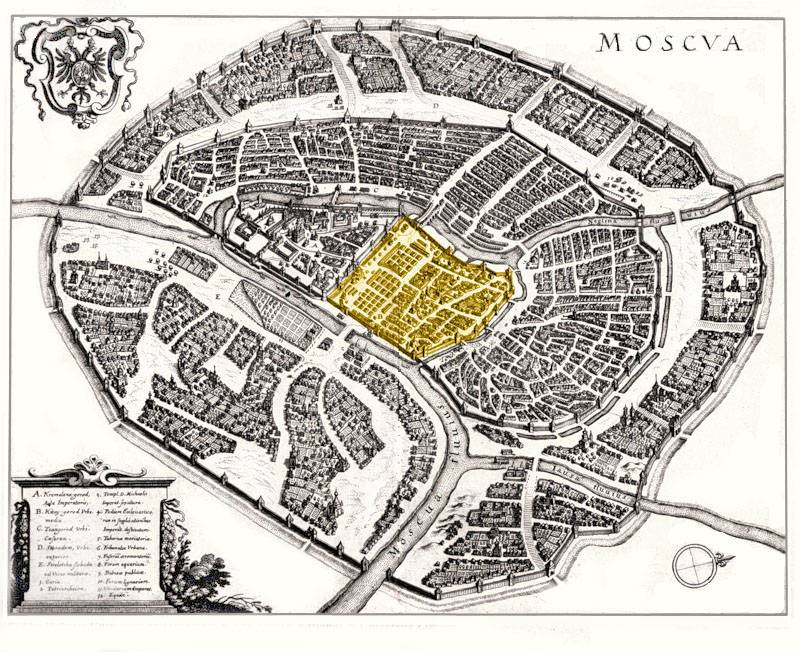
The territory of China-town is marked in yellow on the plan of Matthaus Merian. Xnumx
Starodub war
The situation with the Polish-Lithuanian state was more complicated. Elena Glinskaya proposed to Sigismund to make peace on the basis of the truce concluded in 1522 after the previous Russian-Lithuanian war, and which was extended in 1526 and 1532. Smolensk lands for this truce remained for Moscow. The Polish-Lithuanian elite, hoping to win back the lands lost before the Russian state, announced to him in February 1534 of the year an ultimatum demanding a return to the borders of the 1508 of the year. After the ultimatum was rejected, the Grand Duchy of Lithuania began hostilities.
The war began against the backdrop of an internal conspiracy. The younger of the three Belsky brothers, Semyon Fyodorovich, and okolnichy, Ivan Lyatsky, who were supposed to prepare regiments in Serpukhov, kept in touch with Sigismund and, together with their squads and servants, fled to the enemy. Governors of the large regiment Ivan Belsky and Ivan Vorotinsky, the sons of Vorotinsky Michael, Vladimir and Alexander also participated in the plot. Obviously, when the enemy attacked, they had to destroy the front, go to the side of the Lithuanians. The consequences of such a blow could be catastrophic. However, the conspiracy on time revealed. Semyon Belsky and Lyatsky, feeling threatened, ran in time, the others did not have time, they were tied up. Sigismund met the fugitives amiably, gave good estates. They assured the king that things in Russia are bad. Most of the nobility and the people are unhappy with the rule of Helen, the power is weak. Moscow will not withstand the confrontation with Lithuania.
The Lithuanian army was divided into three groups. The first, under the command of the Kiev governor, Andrei Nemirovich and Anatoly Chizh, in August, sailed into Seversk land and captured Radogoshch. The entire Russian garrison with commander Lykov died in battle. At the same time, attempts were made to take Chernigov, Starodub and Pochep, but without success. Under Chernigov, the Russian garrison made a successful night raid and defeated the enemy. The enemy fled, abandoning artillery and carts. The second detachment under the command of the princes I. Vishnevetsky and A. Koversky crossed the border in September and moved to Smolensk, but could not take the city. The Russian garrison, headed by N. V. Obolensky, counterattacked and rejected the enemy. The third detachment under the command of hetman Y. Radziwill remained in Mogilev as a strategic reserve.
Thus, the attempt of a sudden invasion did not lead to success. Hope for the weakness of Russia did not justify itself. After the retreat of the Lithuanians from Smolensk, Sigismund disbanded his army, leaving only a few thousand people to guard the border fortresses.
Meanwhile, Russia organized a counter-offensive. When news of the battles on the western frontiers reached Moscow, the Grand Duke Ivan had to make a serious decision for the first time, albeit symbolically. The Boyar Duma gathered, and Metropolitan Daniel addressed a four-year-old child: “Sovereign! Protect yourself and us. Act - we will pray. Death to a beginner, but in truth God is a helper. ” And the boy said the right word. Russian army launched against the enemy. The main forces came from Smolensk. Mikhail Gorbaty-Shuisky and Nikita Obolensky commanded the troops, and Ivan Telepnev-Obolensky commanded the advanced regiment. The second detachment, under the command of Fyodor Telepnev, advanced from Starodub.
Tactic campaign was thought out well. For the winter, the Polish-Lithuanian gentry went home, and in the event of a threat, hid in fortresses and castles. But the Russian commanders were not going to get involved in a heavy siege. They used the ancient tactics of the steppe warriors, including the Horde. Strong fortresses were not besieged, but bypassed. The troops went light, without artillery and baggage, using other people's resources (provisions, fodder). The enemy lands were ravaged, burned, robbed, as all armies did. But the churches did not touch, the Orthodox prisoners were released. But the inhabitants were hijacked, for the settlement of their own areas - war is war. The campaign was designed to undermine the military and economic power of the enemy. Like, you want to fight, get it. After the first strike, followed by the second - even more powerful (the number of troops reached 60 - 70 thousand soldiers). Three troops marched in early February 1535, from near Smolensk, Opochka and Starodub.
The main forces of the Russian army swept through the environs of Orsha, Borisov, Polotsk, Vitebsk, and entered the Vilna area, frightening the king’s court. Other troops marched around Mozyr, Turov and Mogilev. In late February - early March, Russian troops returned safely to the borders of the Russian state with rich booty. This campaign undermined the economy of the Grand Duchy of Lithuania, which could not continue the war alone.
It must be remembered that all these were the West Russian lands occupied at one time by Lithuania and Poland. Sooner or later they had to return to the Russian state. But the time has not come yet. Therefore, it is necessary to remember that the name "Lithuanians" (Lithuanian, Polish-Lithuanian troops) is conditional. The overwhelming majority of the “Lithuanians” were Russian and Orthodox. In fact, it was a war between Russians and Russians. But the Russians in Lithuania and Poland were doomed to assimilation, to bind, they were subordinate to the Western control centers. Therefore, the truth was behind Moscow - the center of the unification of all Russian lands and the entire Russian people.
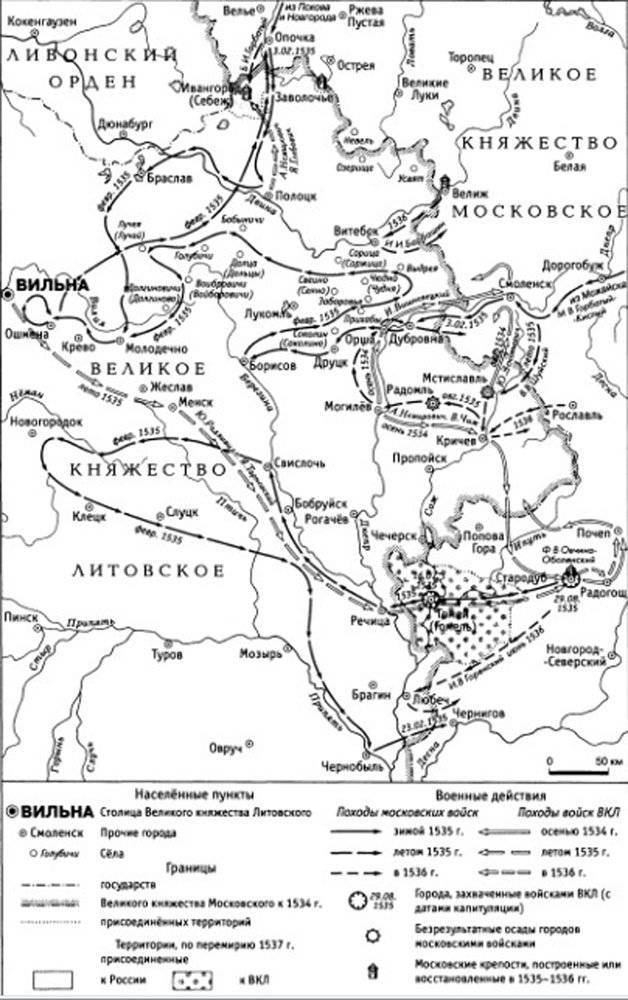
Sigismund hoped not only for the internal weakness of Moscow, but also for the support of the Crimean Khan. But the hopes of the Poles for the Crimeans were not justified at first. Civil strife again began in the Khanate. Sahib-Giray appointed his nephew Islam-Giray, the heir to the throne, the second most important person in the Khanate, transferring him to specific possession of the fortress Ochakov and Perekop. Islam, which was already a khan of the horde, wanted to regain the khan's throne, and intrigued in every way against Sahib. In the summer of 1534, Islam rebelled against Sahib Khan. He repelled the attack of calga and expelled him from the Crimea, but he failed to completely defeat his nephew. Islam strengthened in Perekop, where he proclaimed himself a new khan. He was supported by a part of the Crimean murz. Therefore, Sahib could not support the Sigismund offensive. To work off the money received from Lithuania, he sent a detachment, which together with the Lithuanians attacked the Severshchina. But the khan kept the main part of the army with him, fearing the attack of his nephew. And Islam was looking for an alliance with Moscow, said that he was a friend of Russia and asked for money to wage war.
Meanwhile, at the end of 1534, there were changes in the Moscow government. Unexpectedly, Grand Duchess Mikhail Lvovich Glinsky was arrested. Officially, he was accused of intending to "seize the throne." But we don’t know the true reasons. Perhaps he tried to crush Elena and become a ruler, and for this it was necessary to eliminate Telepnev and push back the Duma boyars who were unhappy with the position of Glinsky. Maybe he just slandered. Glinsky had a great government experience and was a powerful pillar of Helen and Ivan. To eliminate Elena, you first had to remove Michael. As a result, Glinsky went to prison and soon died. Regency Council ceased to exist.
The war continued. In the 1535 campaign of the year, Russian troops again launched an offensive on the northern flank. The troops commanded by Vasily Shuisky, Telepnev again led the advanced regiment. The cavalry ravaged Lithuania. But under the cover of this raid, another army entered the Lithuanian territory from Pskov and on the shore of Lake Sebezhsky laid the Sebezh fortress (Ivangorod-on-Sebezh). The fortress was erected in record time (from June 29 to July 20). Construction work was led by Italian architect Petrok Maly, famous for construction activities in Moscow. The place for the new fortress was chosen on the cape deeply prominent in Lake Sebezhsky, which in itself served as a good defense. The wooden structures of Sebezh were protected from all sides by a well-thought-out system of earthen ramparts and bastions. As a result, the Russian army received an important stronghold for action against the enemy.
Sigismund was also not inactive. He gathered a large army (40 thousand soldiers) and launched an offensive on the southern flank. Moscow considered such an opportunity, and another army was assembled on the Oka River. However, Sigismund and here managed to find a good move. He outbid the Russian "friend" Islam-Giray, and he threw his troops into Ryazan. The regiments of Dmitry Belsky and Mstislavsky had to be directed against the Tatars. Crimeans smashed and discarded. But Sigismund achieved the main thing - the Russian south-western cities were without support. The Polish-Lithuanian army launched an offensive in a southwesterly direction. The troops of the hetmans of Tarnowsky and Ostrozhsky moved towards Gomel. His voivode Obolensky-Shchepin left the fortress without a fight. Then the royal rati went to Starodub.
30 July, the enemy laid siege to the Russian fortress. At that time it was a rather large city, the center of Seversk land. The defense was led by Prince Fedor Ovchina-Obolensky (brother of the Grand Duchess's favorite). Prince Fyodor, his warriors, together with the townspeople, bravely defended themselves. Russian repulsed several assaults. The Lithuanians failed underground, blew up the fortifications, a fire started in the city. The Russian voivode, even in such a desperate situation, led the warriors into a fierce counterattack, trying to break through to the enemy headquarters. But I could not win, the forces were unequal. He was surrounded and crushed. Telepnev and Prince Sitsky were captured, the other governor died. Mad enemies broke into the city and massacred, not giving mercy to anyone. Trying to lock up and fight back in the houses, burned. In Russian Starodub 13 was killed thousands of people. And the warriors, and citizens, and residents of the surrounding villages.
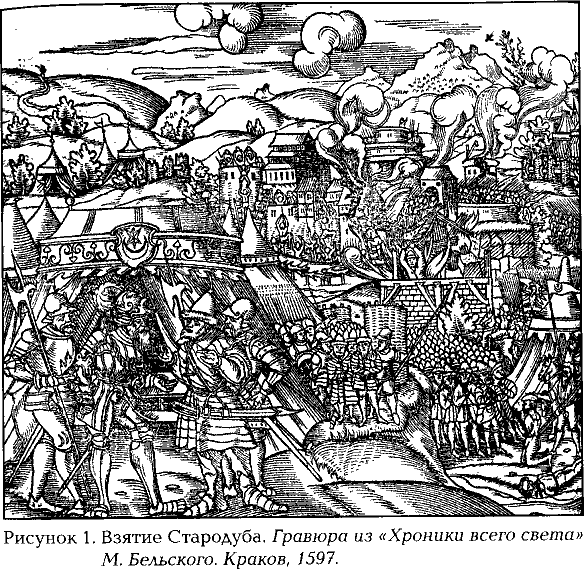
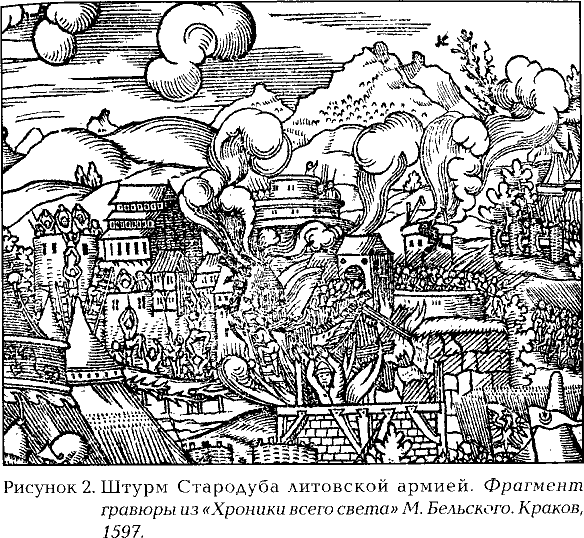
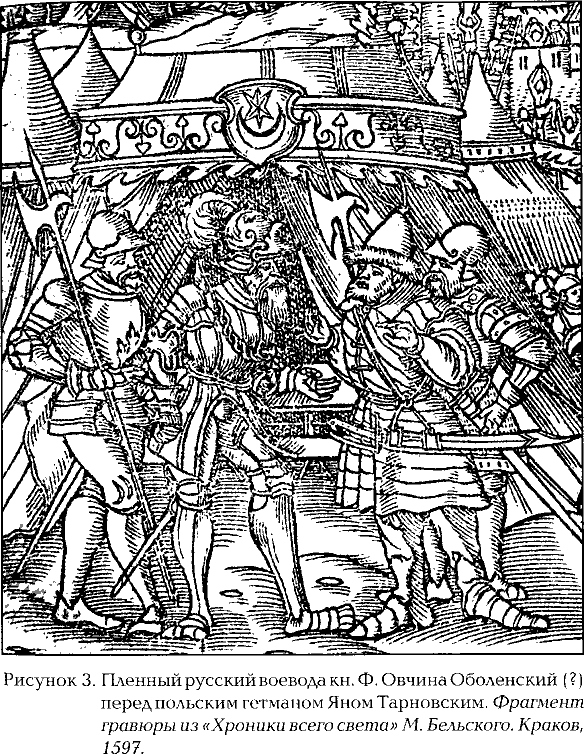
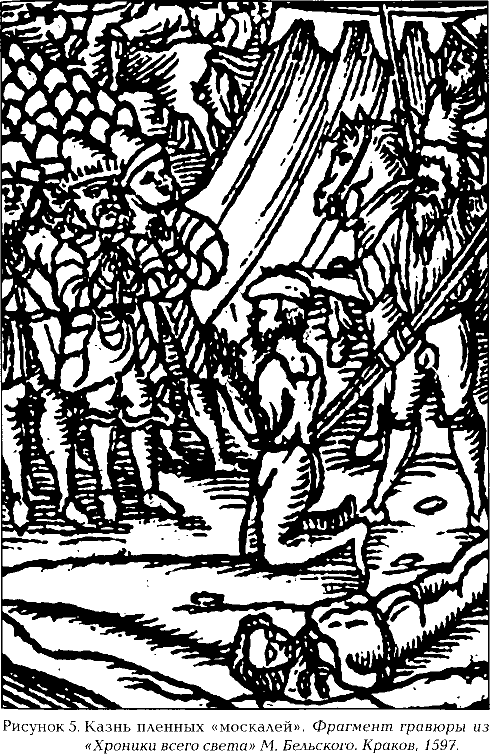
Source: Krom MM Starodubskaya war. 1534-1537. Of stories Russian-Lithuanian relations. - M .: Frontiers XXI, 2008
The enemy moved to Pochep. The garrison there was a small fortification weak. Voivod Sukin himself burned the city, ordering the population to go deep into the country. On the ashes of Starodub and Pochep there was nothing to profit. Losses were serious. Therefore, fearing the approach of the main forces of the Russian army, the Lithuanians retreated from Severshchina. The failure of the offensive and the exhaustion of forces and means forced Sigismund to begin negotiations for peace.
Moscow also wanted peace, since the threat now came not only from Lithuania and the Crimea, but also Kazan. The Crimean Khan Sahib and his nephew Safa-Girey (he was already sitting on the Kazan table), although they were engaged in confrontation with Islam-Giray, did not forget about Kazan. Crimean agents were active there, negotiations were held with opponents of the world with Moscow. And not without success. The anti-Russian party has grown bolder. Kazan set off from previous defeats from Moscow, the death of Vasily III and the Russian-Lithuanian war inspired hopes that their time has come. The conspirators carried out a coup, killed the Kazan Khan Jan-Ali, who was guided by Moscow. Safa-Girey regained the Khan's throne in Kazan and was strengthened with the help of the Crimean troops. He married Syuyumbike, wife of Gian-Ali, daughter of the Nogai biya Yusuf, in order to attract the Nogai to his side. Thus, Moscow again received a threat in the east.
In the meantime, the Lithuanians tried to change the situation for the last time in their favor. 20-thousand a detachment under the command of Andrei Nemirovich and Jan Glebovich 27 in February 1536 laid siege to the fortress of Sebezh. However, the enemy was waited here, the fortress was well fortified, had strong artillery and a garrison led by princes Zasekin and Tushin. All attempts to seize the fortress by storm ended in failure. When this failed, Sebezh was subjected to massive shelling of the Polish-Lithuanian artillery. However, the effectiveness of the shelling, due to the inept actions of the besieging and good earthen fortifications of Sebezh, as well as its advantageous location, was low. In addition, the Russian artillery acted more skillfully, the gunners hit the enemy batteries and the camp, causing confusion and demoralizing the enemy. Finally, the Sebezh garrison chose a convenient moment and counterattacked the Lithuanian troops. Russian warriors acted bravely and decisively, the enemy could not resist the onslaught and ran. Polish-Lithuanian "knighthood" in heavy armor ran across the thin ice of the lake. As a result, the ice beneath them broke, thousands of people found themselves in icy water. Our warriors chopped off those who were trying to get out, shot from squeals and cannons. Those who still managed to get out of the water, frozen in the surrounding forests. The victory was complete. Almost all of the Polish-Lithuanian army died. Russian troops destroyed the color of "knighthood". In Moscow, triumphant trophy guns and banners put up to show the people.
After that, the strategic initiative passed to the Russian side. There were trips under Vitebsk and Lyubech, where the suburbs were burned down, the surroundings were ravaged and a huge full was made. At the same time, the lost cities of Starodub and Pochep were being restored. In addition, the Russian government pursued a successful policy of building fortresses on enemy territory — Velizh and Zavolochye were built after Sebezh. Italian Ruggieri, who visited Russia, wrote that such operations were carried out with "incredible speed." Russian masters examined the terrain, on their territory they were preparing the forest, were fitting, marking. Then the blanks were lowered along the rivers to the right place and “in one instant they were joined”, the fortress houses were covered with earth. The Poles only received news of the start of construction, and the fortress was already standing and there was a strong garrison in it. And the border shifted to the west, Russia slowly, but stubbornly returned its ancestral lands.
However, to achieve a significant victory and the return of the Western Russian lands in this war was still not possible. Russia was connected to the Crimean and Kazan "splinter". It was necessary to solve the problem of the wreckage of the Golden Horde, to get a calm rear in the east, in order to return the West Russian lands. Thus, Lithuanian diplomacy was able to temporarily reconcile the Crimean khans Sahib and Islam, to throw them into Russia. They attacked Belev, but were discarded. Attacks began from the east. Kazan king Safa-Giray called Nogais, gathered detachments of Cheremis (Mari), Bashkir. When they learned about these preparations in Russia, the army was sent to meet the enemy under the command of Gundorov and Zasetsky. But they did not dare to take the battle and retreated. The governors of Nizhny Novgorod also decided not to join the battle. Residents of Balakhna came out into the field, but were defeated.
When news of the invasion in the east reached Moscow, the Grand Duchess and the boyars began to take emergency measures. Gundorov and Zasetsky were removed from their posts and arrested. Under the Nizhny Novgorod sent new governor, Saburova and Karpov. The Kazan horde at that time sold out lava for robbery and capture of prisoners, so it was easily broken. The prisoners were sent to Moscow. They decided to show rigidity. All were executed as rioters who violated the oath. In the meantime, Safa-Girey himself launched an offensive with personal guards, Crimean and Nogai units. Part of the Russian army moved up the Volga, and in the battle between Galicia and Kostroma, Saburov's army was defeated. Safa Giray in January 1537 approached Murom. The defenders of Murom repulsed several storms, detaining the enemy. The bourgeois Cossacks boldly acted, smashed the Kazan rears, destroyed their separate detachments scattered for plunder. At this time, fresh shelves approached from Moscow, and Safa-Girey retreated. Under these conditions, it was impossible to continue the war with Lithuania.
Thus, the defeat at Sebezh and other failures convinced the Lithuanian side of the need to begin negotiations. The Russian government was also interested in the world, due to the increased threat from the Crimean and Kazan Khanates. Negotiations rested on the issue of extradition of prisoners and territorial issues. In Lithuania there were few but more notable Russian captives, whereas in captivity the Russians had much more less noble Lithuanians. After a long debate in 1537, an armistice was concluded, according to which, due to the stubbornness of Lithuania, there was no exchange of prisoners, and the territorial issue was resolved on the actual state of affairs at that time. The Gomel parish, claimed by the Russian state, was ceded to Lithuania, and the fortresses of Sebezh, Velizh and Zavolochye, which were located in the former Lithuanian territories, were officially recognized by the Russian state.
Information